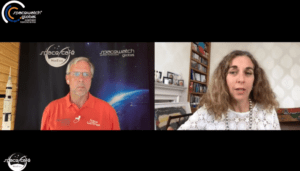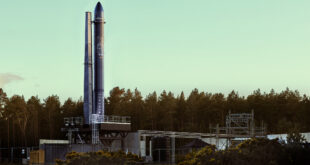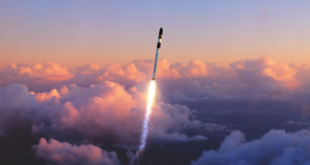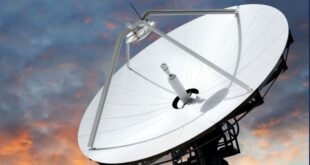by Luisa Low
 During this week’s Space Café, SpaceWatch.Global publisher Torsten Kriening met with space strategist and former Chief Executive for the UK Space Agency, Katherine Courtney, to discuss space sustainability and her role as founder of education charity PrimarySpace.
During this week’s Space Café, SpaceWatch.Global publisher Torsten Kriening met with space strategist and former Chief Executive for the UK Space Agency, Katherine Courtney, to discuss space sustainability and her role as founder of education charity PrimarySpace.
Katherine is the current strategic adviser for Arqit, an encryption platform based in London. She was previously the regulator for UK License Space Operations and has worked with organisations such as Avascent, the Global Network on Sustainability in Space and MULTIPLY Space to create clear strategies, manage risks and multiply returns on innovation investment; bring government, researchers and businesses together to apply innovation to key policy aims; and support start-ups to scale-up.
This week, she and Torsten discuss the biggest risk of all – what will our contemporary use of space mean for future generations, and are we sleepwalking into the next catastrophe?
The solution to space debris is long overdue
Last week space debris became the topic of family dinner table conversations worldwide, after reports that China’s Long March rocket had careened violently into Earth. Most of the rocket was burnt up in Earth’s atmosphere, but several fragments crashed into the Indian Ocean. While Long March’s uncontrolled re-entry has ignited a long-overdue global discussion about space sustainability, Katherine believes it’s an issue currently being dealt with using outdated methods and regulation.
“The biggest issue facing space today is sustainability. Space is changing very quickly. It’s becoming more contested and congested. The US, the UK, NATO, and other countries have declared space a war-fighting domain.”
The European Space Agency estimated that in Earth’s orbit spin 170 million pieces of space debris, which constantly threaten to collide with key infrastructure. With so many fragments spinning in orbit and satellites being launched in growing numbers, the fact there have been more near-misses than serious collisions comes down to sheer luck – an issue that requires urgent attention from policymakers and space outfits.
“Even a tiny speck of paint, if it’s travelling at 17,500 miles per hour, can have more of an impact than the fastest bullet.”
“Here we are managing these disruptive 21st Century activities, with tools and techniques that were developed in the 1960s, and international agreements from the 1980s: it’s just not fit for purpose.”
Digital Twins: a method to the madness?
Space – by definition – is a domain without borders, making regulation complex. According to Katherine, there may be a tangible solution: data. While in the space arena there is no shortage of data, there countless sources of information captured and generated by governments and space outfits. Because of this, Katherine believes a method to the madness must be developed. This method she says, could be the creation of the night sky’s “digital twin”, which would provide, monitor and analyse a trusted, verifiable set of data that is updated in real-time.
“You can’t actually legislate and come up with international treaties that are enforceable, unless you can monitor, verify and inspect what’s going on. I learned that, over nearly 15 years in central government, writing large pieces of legislation, that you shouldn’t try to pass laws that you can’t enforce.”
Could the children of today be the space shepherds of tomorrow?
The current generation of children – often referred to as “Gen Z” – are passionate about the environment and care deeply about sustainability. As the founder of the UK-based charity PrimarySpace, Katherine works with children to encourage and inspire them to pursue skills and careers in STEM. She hopes that this early education will help to close the current STEM skills shortage – skills she believes will be needed to develop solutions for Earth’s – and its Orbit’s – most pressing environmental and sustainability problems.
“They will be the future skilled workers that the space sector needs to develop solutions to create more sustainable technologies for space.”
The issue, however, is educating children on what a career in STEM or space could actually look like.
“When you talk about jobs in space, you talk about astronauts. There’s only been a couple of hundred astronauts in the history of the world ever, and so far only twelve people to walk on the moon.”
“But most children would say they’re not interested in being astronauts, because it’s too risky.”
“But what they don’t know is there are thousands of people behind every space mission who do really interesting work. If we want to increase diversity and inclusion then we need to teach our kids about the “Hidden Figures” behind the missions.”
To listen to Katherine Courtney’s insights into space budgets, you can watch the full program here.
Luisa Low is a freelance journalist and media adviser from Sydney, Australia. She currently manages Media and Public Relations for the University of Sydney’s Faculty of Engineering.





